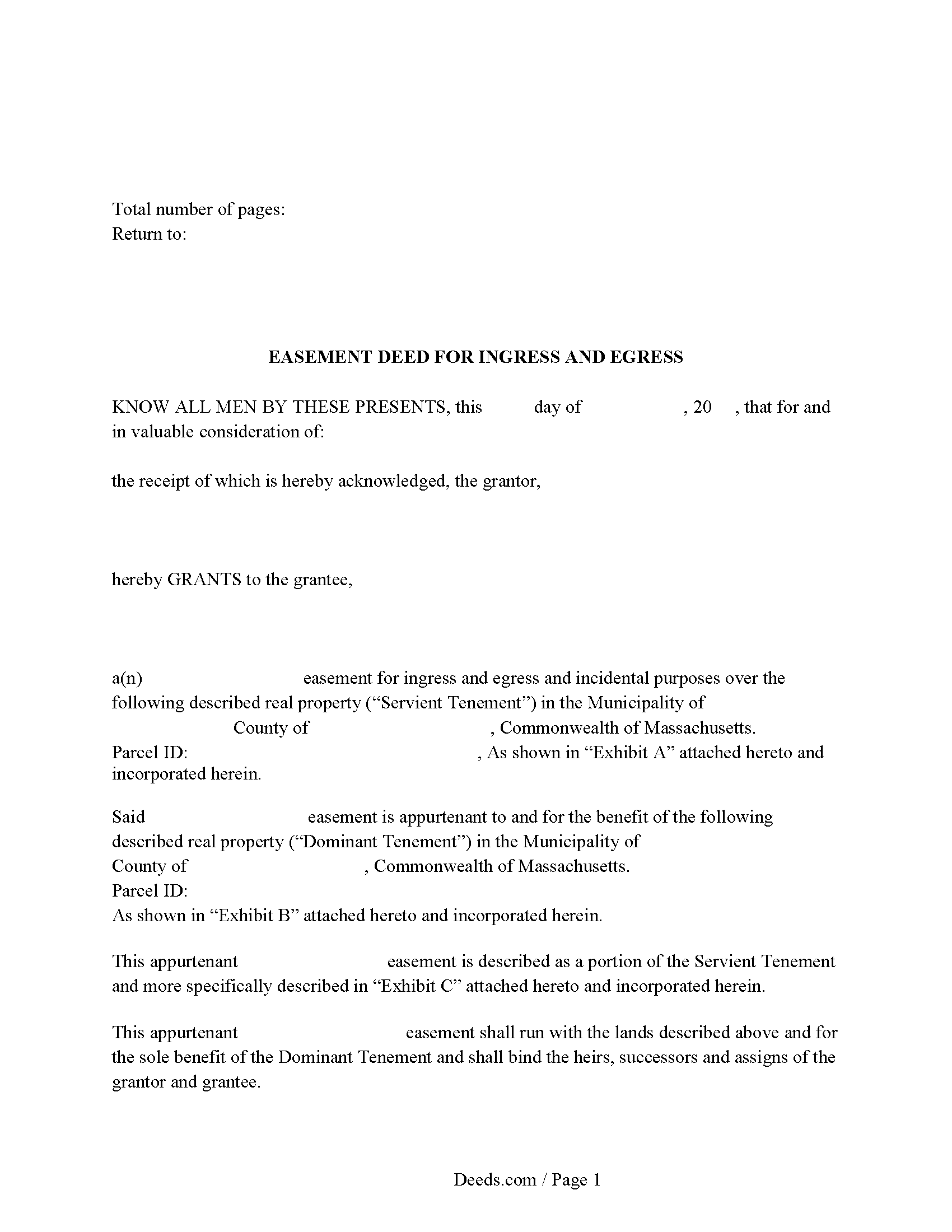Massachusetts Easement Deed Forms

Massachusetts Easement Deed Overview

How to Use This Form
- Select your county from the list on the left
- Download the county-specific form
- Fill in the required information
- Have the document notarized if required
- Record with your county recorder's office
An easement is a non-possessory and non-ownership right to use another person's property for a specific use. The easement deed is the legal instrument that creates this right. Easements are either affirmative or negative and can be appurtenant or an easement in gross. An appurtenant easement benefits the dominant estate and runs with the land. Easements in gross benefit an individual or legal entity. In Massachusetts, easements can be created by deed, will, or contract; or by prescription or implication. In a conveyance of real estate in Massachusetts, all rights, easements, privileges, and appurtenances belonging to the granted estate are included in the conveyance, unless a contrary intention is stated in the deed (183-15).
According to section 187-1A of the Massachusetts General Laws, an easement of direct sunlight can be acquired over the land of another by direct grant or covenant, or by a solar access permit. The contents of a solar easement should follow the guidelines as set forth in 187-1 of the Massachusetts General Laws. When a person erects a house or other structure with windows overlooking another's land, they do not, by the mere continuance of such windows, acquire an easement of light and air so as to prevent the erection of a building on such land (187-1).
A right or privilege of way or other easement cannot be acquired by adverse use or enjoyment upon or over the land of another, unless the use or enjoyment is continued uninterrupted for twenty years (183-2).
An easement deed should be signed and acknowledged by the grantor. A real estate deed that is required to be recorded in order to provide constructive notice must have a certificate of acknowledgment or proof of execution endorsed on the deed or attached to it. The certificate is recorded with the deed (183-29). An easement deed can be acknowledged by one or more of the grantors or by the attorney executing it. The officer before whom acknowledgements are made should endorse the certificate of acknowledgement on the deed. Acknowledgments made in Massachusetts can be made before a notary public or justice of the peace. Acknowledgments made out of state may be made before any of the officers listed in 183-30b of the Massachusetts General Laws (183-30).
In order for an easement deed to be valid against people other than the grantor, his heirs, and devisees, and persons having actual notice it must be recorded in the registry of deeds in the county or district where the land lies (183-4). The record of an easement deed, duly acknowledged or proved as provided, is conclusive evidence of the delivery of the instrument, in favor of purchasers for value without notice (183-5). Massachusetts has a race-notice recording act, which means that constructive notice is determined by the recording of documents.
(Massachusetts ED Package includes form, guidelines, and completed example)
Important: County-Specific Forms
Our easement deed forms are specifically formatted for each county in Massachusetts.
After selecting your county, you'll receive forms that meet all local recording requirements, ensuring your documents will be accepted without delays or rejection fees.
How to Use This Form
- Select your county from the list above
- Download the county-specific form
- Fill in the required information
- Have the document notarized if required
- Record with your county recorder's office
Common Uses for Easement Deed
- Transfer property between family members
- Add or remove names from property titles
- Transfer property into or out of trusts
- Correct errors in previously recorded deeds
- Gift property to others